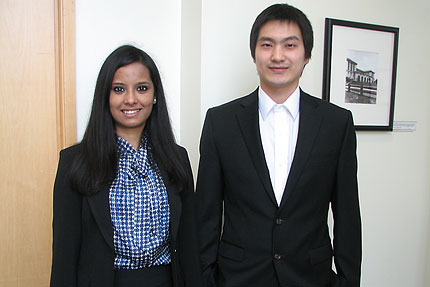
Graduate students Anindita (Dia) Das and Qin Gao have been awarded McWilliams Fellowships
Graduate students Anindita (Dia) Das and Qin Gao have been awarded McWilliams Fellowships in recognition of their outstanding creativity, dedication and commitment to carrying out leading-edge research. The fellowships provides tuition, stipend and fees for up to one year of graduate study, as well as $1,000 for conference travel or other research expenses.
Anindita (Dia) Das, a fourth year Ph.D. student in the Department of Chemistry, synthesizes highly stable gold nanoclusters—containing only dozens of gold atoms—that are capable of being used in industrially relevant catalytic reactions. Das devised a strategy for manipulating nanoclusters at the single-atom level, allowing her to wield a precise level of control over their production. In collaboration with Tao Li, a graduate student in Nathaniel L. Rosi's group at the University of Pittsburgh, she used X-ray crystallography to determine their total structures, including the gold core and the surface molecules surrounding it. Deciphering the total structure of gold nanoclusters is critical for understanding their novel properties as well as the origin of their catalytic power, which will ultimately contribute to the rational design of new catalysts for industrial chemical processes.
“Anindita has carried out innovative research and produced exciting science, reflected in two first-author papers in the Journal of the American Chemical Society,” said her thesis advisor Rongchao Jin, an associate professor of chemistry. “Her research achievement in the past three years or so is surely outstanding.”
Qin Gao studies the nanophysics that occurs at the surfaces between crystalline grains. A fourth year Ph.D. student in the Department of Physics, Gao analyzes atomically thin films of one material placed on another material, specifically bismuth on nickel. Exotic two-dimensional physics arises at the surfaces between the materials, and Gao is using nanostructure modeling and quantum mechanical energy calculation to understand it. Together with his advisor Professor Michael Widom, Gao has formulated a new picture of the structure and electronic properties of the nickel/bismuth system. This work can explain the observed phenomenon of embrittlement of nickel due to bismuth impurities and can be extended to many other combinations of elements, utilizing first principles computations coupled with structure modeling.
“Qin has proven an invaluable collaborator not only in my research project, but he also has established himself as a creative independent scientist whose expertise is sought by others,” Widom said.
The McWilliams Fellowship was established in 2007 by alumnus Bruce McWilliams, president and CEO of SuVolta and a Carnegie Mellon University trustee, to support MCS graduate students conducting leading-edge research in fields such as nanotechnology, biophysics and cosmology where Carnegie Mellon's advantages can lead to high impact.
Originally published: https://www.cmu.edu/mcs/news-events/2014/0507-mcwilliams-fellows.html